- About Us
- Columns
- Letters
- Cartoons
- The Udder Limits
- Archives
- Ezy Reading Archive
- 2024 Cud Archives
- 2023 Cud Archives
- 2022 Cud Archives
- 2021 Cud Archives
- 2020 Cud Archives
- 2015-2019
- 2010-2014
- 2004-2009
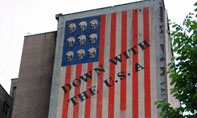 |
America's Pressure on Iran |
"This notion that the United States is getting ready to attack Iran is simply ridiculous. Having said that, all options are on the table."
U.S. President George Bush, February 22, 2005.
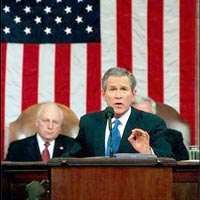 Perhaps one of the most surprising turn of events since George Bush's re'election in 2004 has been his recent renewal of intense pressure upon Iran (with, granted, some European support) to put an end to what he claims is a nuclear programme currently under way in that country. The pressure is surprising for a number of reasons, but perhaps most significantly because common sense would likely dictate that now is not the time for such aggressive manoeuvres. Regardless of the declared 'success' of the Iraqi elections held in January (in which a scant number of the Sunni population even bothered to vote), criticism of the war both on the domestic and international front is still fierce, especially as casualties continue to grow amid ongoing insurgent opposition. U.S. forces are currently stretched to the limit, and military recruiters are fast failing to meet their quotas from month to month. American relations with the rest of the world are still at an all'time low, irrespective of Bush's heavy campaigning in Europe for support and friendship over the past few weeks. Additionally, for a man undoubtedly conscious of securing a positive legacy during his second term, even if Bush does, as his aides suggest, genuinely believe in his State of the Union rhetoric loaded with terms like 'freedom' over 'oppression', legacies will be at risk if he decides to make moves dictated by his heart over his head. That more hasn't been made in the mainstream media of the quite laughable fact that Bush missed out on targeting the right country with alleged nuclear weapons in the Middle East 'by only a few miles' is curious. And if he makes the same mistake in Iran that he made in Iraq, at further human, financial, and diplomatic loss, and finds no nuclear weapons, rest assured there will be a special sub'section titled 'Feckless Leadership' in the future encyclopedia appraisals of the Presidency of one George W. Bush.
Perhaps one of the most surprising turn of events since George Bush's re'election in 2004 has been his recent renewal of intense pressure upon Iran (with, granted, some European support) to put an end to what he claims is a nuclear programme currently under way in that country. The pressure is surprising for a number of reasons, but perhaps most significantly because common sense would likely dictate that now is not the time for such aggressive manoeuvres. Regardless of the declared 'success' of the Iraqi elections held in January (in which a scant number of the Sunni population even bothered to vote), criticism of the war both on the domestic and international front is still fierce, especially as casualties continue to grow amid ongoing insurgent opposition. U.S. forces are currently stretched to the limit, and military recruiters are fast failing to meet their quotas from month to month. American relations with the rest of the world are still at an all'time low, irrespective of Bush's heavy campaigning in Europe for support and friendship over the past few weeks. Additionally, for a man undoubtedly conscious of securing a positive legacy during his second term, even if Bush does, as his aides suggest, genuinely believe in his State of the Union rhetoric loaded with terms like 'freedom' over 'oppression', legacies will be at risk if he decides to make moves dictated by his heart over his head. That more hasn't been made in the mainstream media of the quite laughable fact that Bush missed out on targeting the right country with alleged nuclear weapons in the Middle East 'by only a few miles' is curious. And if he makes the same mistake in Iran that he made in Iraq, at further human, financial, and diplomatic loss, and finds no nuclear weapons, rest assured there will be a special sub'section titled 'Feckless Leadership' in the future encyclopedia appraisals of the Presidency of one George W. Bush.
If Iran were to acquire nuclear weapons it would certainly upset more than a few neighbours in the Middle Eastern region, and it is important that Iran cooperate fully with the International Atomic Energy Agency as they continue to pursue nuclear energy. But it is debatable as to whether or not, beyond the risks of any nuclear weapons falling into the wrong hands anywhere, Iran would become that much of an active, imminent threat if they were to produce such weaponry. With nuclear Israel, India, Pakistan, Russia and the United States hovering nearby, surely, as Peter Preston of the February 11 Guardian noted, the old nuclear deterrence theory of mutually assured destruction, or MAD, would most likely kick into gear and keep everyone's fingers away from the launch button.
Throughout the first week of March, somewhere amid the latest uproar involving Syria's presence in Lebanon, it has been interesting to see Republican spin'doctors and conservative commentators go into overdrive amid fears of U.S. movements against Iran. The American government's focus in that country has been conveniently pushed into the background amid sugar'coated appraisals of a 'new wave' of democracy in the Middle East, touching Iraq, Afghanistan, Palestine, Egypt, even Saudi Arabia, thanks to Uncle Sam's positive influence in the region. On the U.S. NBC Meet the Press broadcast of March 6th, it was quite jarring to hear Kate O'Beirne of the National Review chastise ongoing Democratic party cynicism about democratisation in the Middle East:
"... given the remarkable things that appear to be happening in that part of the world (the Middle East), I think the Democrats have to be extremely careful not to sound so resentful and pessimistic. They, of course, run the risk of being on the wrong side of history because something clearly seems to be happening there. Any party that appears to be welcoming a defeat for America because that's good for them politically is in a terrible position, and their traditional commitment to Democratic forces, fighting against repressive regimes, has been not much in evidence when they seem so unhappy or begrudging about these remarkable developments."
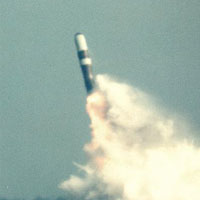 The problem, of course, is that this kind of errant argument allows for little or no constructive criticism or American Middle Eastern policy unless you want to be labelled by the likes of Ms. O'Beirne as being 'on the wrong side of history'. This tactic was used in the same way that opposition to Iraq was labelled as 'hurting the troops on the ground'. Now, ironically, using some creative countering of the fundamental democratic principle of reasoned party and policy opposition, conservatives in America think they are promoting democracy abroad but it is at the expense of their beloved freedom of speech ideals back home. It is almost as if they are now stating 'Yes, we made a fundamental error by going into Iraq and we may have even lied to the world about why we should invade, but look at all the democracy we've now created as a result.'
The problem, of course, is that this kind of errant argument allows for little or no constructive criticism or American Middle Eastern policy unless you want to be labelled by the likes of Ms. O'Beirne as being 'on the wrong side of history'. This tactic was used in the same way that opposition to Iraq was labelled as 'hurting the troops on the ground'. Now, ironically, using some creative countering of the fundamental democratic principle of reasoned party and policy opposition, conservatives in America think they are promoting democracy abroad but it is at the expense of their beloved freedom of speech ideals back home. It is almost as if they are now stating 'Yes, we made a fundamental error by going into Iraq and we may have even lied to the world about why we should invade, but look at all the democracy we've now created as a result.'
 There's little doubt the spread of rights and freedom throughout the world is a positive development. But in the face of dirty politics, wherein a Pakistani dictatorship or a heavy'handed Israeli nation's right to have nuclear weapons is upheld as necessary, and an Iranian possibility of having weapons is deemed unjust and the nation declared an 'outpost of tyranny', one has to wonder whether the purity of all this democratic sentiment has gone foul. And declaring recent democratic developments in the Middle East historical successes before they've even been proven in the long term smells suspiciously like diversionary party spin, and the results still don't necessarily justify the troubling means.
There's little doubt the spread of rights and freedom throughout the world is a positive development. But in the face of dirty politics, wherein a Pakistani dictatorship or a heavy'handed Israeli nation's right to have nuclear weapons is upheld as necessary, and an Iranian possibility of having weapons is deemed unjust and the nation declared an 'outpost of tyranny', one has to wonder whether the purity of all this democratic sentiment has gone foul. And declaring recent democratic developments in the Middle East historical successes before they've even been proven in the long term smells suspiciously like diversionary party spin, and the results still don't necessarily justify the troubling means.
There is, of course, no excusing the human rights violations that have been firmly entrenched in the Middle East for decades. But the fact is, while we should welcome and encourage democratic, liberal reform in the Middle East, in the case of Iran, the United States may better serve the democratic cause by taking a step back and removing that nation from their immediate target list. Pre'9/11, it was 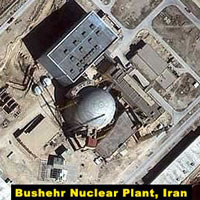 well established that in Iran, even as the ayatollahs had kept a firm grip on the government, there was a growing, and increasingly vocal youth starving for democratic reform. If George Bush continues to pressure and isolate Iran, or even, in a more extreme eventuality, manages to install a puppet government in the vein of a Vietnam era Nguyen Van Thieu, he will risk alienating an entire generation that would likely have welcomed democracy in a few short years. Certainly America's own invasive criticism of Russia's need for domestic reform, justified or not, has, by its lack of diplomatic subtlety, irked Vladimir Putin enough to assert that his nation will continue to support Iran's development of nuclear energy.
well established that in Iran, even as the ayatollahs had kept a firm grip on the government, there was a growing, and increasingly vocal youth starving for democratic reform. If George Bush continues to pressure and isolate Iran, or even, in a more extreme eventuality, manages to install a puppet government in the vein of a Vietnam era Nguyen Van Thieu, he will risk alienating an entire generation that would likely have welcomed democracy in a few short years. Certainly America's own invasive criticism of Russia's need for domestic reform, justified or not, has, by its lack of diplomatic subtlety, irked Vladimir Putin enough to assert that his nation will continue to support Iran's development of nuclear energy.
Which of course begs another question. While it is understandable that the United States or, more appropriately, the International Atomic Energy Agency should be watchful of any nation developing nuclear capabilities, especially where there is a history of extremist governments and instability, what of those nations genuinely seeking nuclear energy over nuclear weapons? Unstable and risky as it is for so many reasons, nuclear power is still generally the most effective long'term means for a nation rich or poor to pursue civil development. It would be encouraging to see more nations join the ranks of Japan, Germany and Australia and enjoy the benefits of nuclear power without developing the weapons. Iran, though oil rich, has always insisted that it is merely pursuing nuclear power to sustain their growing population. And yet if America's only worry was Iran's nuclear capability, then by now we would have seen them enthusiastically agree with the European proposal to scrap Iran's uranium enrichment program in exchange for technological, financial and political support
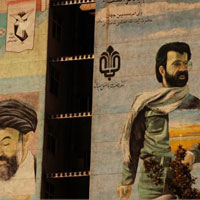 But George Bush's administration clearly wants more than just a nuclear free Iran. They want more 'dominos' to fall in the Middle East and are again starting to force their hand, as even a cursory glance through the political suggestion and spin of the past month or two indicates. George Bush has said, 'all options are on the table', and last month as that kind of pressure mounted, Iran called on all nations throughout the region to join together to defeat what it termed U.S. and Israeli plots. Iran and Syria's resulting announcement that they had formed a pact to confront such security threats was the first major indication that the situation in the Middle East was now starting to fester. And the longer America shirks diplomatic solutions, ignores the contradictions in its own nuclear policy, and tries to force democracy and reform upon other nations, the more Iranians that once welcomed pro'Western change will rally together to resist the bullish implementation of an imposed democracy in their own country.
But George Bush's administration clearly wants more than just a nuclear free Iran. They want more 'dominos' to fall in the Middle East and are again starting to force their hand, as even a cursory glance through the political suggestion and spin of the past month or two indicates. George Bush has said, 'all options are on the table', and last month as that kind of pressure mounted, Iran called on all nations throughout the region to join together to defeat what it termed U.S. and Israeli plots. Iran and Syria's resulting announcement that they had formed a pact to confront such security threats was the first major indication that the situation in the Middle East was now starting to fester. And the longer America shirks diplomatic solutions, ignores the contradictions in its own nuclear policy, and tries to force democracy and reform upon other nations, the more Iranians that once welcomed pro'Western change will rally together to resist the bullish implementation of an imposed democracy in their own country.
